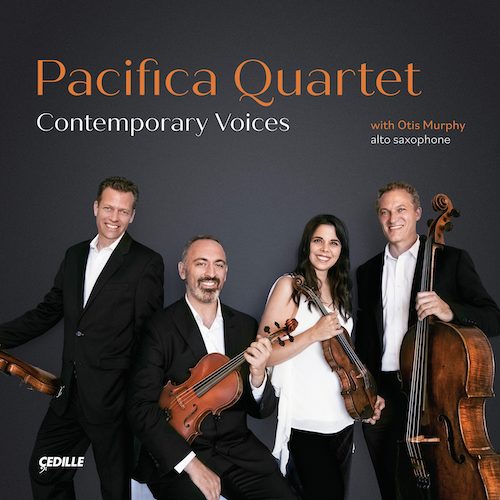Pacifica Quartet serves up a bracing disc of women composers

Pacifica Quartet; Otis Murphy, saxophonist. Ran: Glitter, Doom, Shards, Memory—String Quartet No. 3. Higdon: Voices. Zwilich: Quintet for Alto Saxophone and String Quartet (Cedille Records).
Ellen Taaffe Zwilich continues to produce inventive, musically sophisticated scores for diverse instrumental combinations. A Miami native and the first woman to win the Pulitzer Prize for music (for her Symphony No. 1 in 1983), Zwilich has rekindled her early enthusiasm for jazz in the last decade.
Zwilich’s Quintet for Alto Saxophone and String Quartet, the featured score on the Pacifica Quartet’s new album “Contemporary Voices,” continues her exploration of America’s most original art form in a classical setting. The 2007 work is typically concise with three movements spanning just 17 minutes. Still Zwilich’s penchant for unexpected thematic incident and inspired melodic paths pervades every bar in a voice both accessible and thoroughly contemporary. The work’s opening movement is haunting and dark with mellow sax tones set against the strings’ insistent rhythmic backdrop. A hard-driving beat pervades the middle movement which displays the solo instrument’s full range in brilliant riffs. After wailing blues in the introduction, a suggestion of bebop takes full reign in the finale. A slow, more ominous coda brings a return to the moody strains of the opening movement before a final blast from the sax in the concluding measures.
Zwilich’s demands for the saxophone are formidable, with writing that spans the instrument’s range and color spectrum. Otis Murphy, a faculty member at Indiana University’s Jacobs School of Music, conquers every virtuosic challenge, playing with clarity, tonal glow and idiomatic zest. The Pacifica players bring the same finely blended ensemble, intensity of expression and sense of adventure to Zwilich’s score and the other works on the recording that they have displayed in Beethoven and Shostakovich quartets, live and on disc.
The other major work on the disc is Glitter, Doom, Shards, Memory—String Quartet No. 3 by Shulamit Ran. The Israeli-American composer began her career as a concert pianist before turning to composing and teaching. (For 32 years she was on the faculty at the University of Chicago.) This writer recalls hearing Ran give an outstanding performance of Schumann’s Piano Concerto in Miami in the 1970’s.
Her quartet is cast in four movements, lasting 22 minutes. The Holocaust hovers over the score, particularly the early death of German Jewish painter Felix Nussbaum (1904-1944). In the first movement (“That which happened”) eerie figurations are interrupted by strident interjections setting the menacing aura. “Menace” is an elegant dance macabre, while harsh, hallucinatory fragments overlap in the third movement (“If I perish”). Although meant to encompass a sense of tragic finality, the finale (“Shards, Memory”) is disappointing, strangely lightweight and ineffective. Although uneven, at its best there is real communicative emotion in Ran’s musical canvas.
Jennifer Higdon’s Voices (1993) completes the trio of works by female composers, all of whom have won Pulitzer prizes over the past four decades. Higdon has long displayed a penchant for sonic combinations that audiences find attractive and compelling (blue cathedral) if seldom challenging. The restless shimmer of sonorities in “Soft Enlacing”(second movement) best showcases Higdon’s skill at melding overlapping timbres. The initial “Blitz” might better be termed “chaos” and the final “Grace” is overwrought and melodramatic. In this early work, one gets the sense of a young composer seeking to find her personal voice.
Recorded at concert halls at Indiana University (where Pacifica is quartet in residence) and the University of Chicago, the 58-minute disc projects a warmly resonant, up-close soundscape, especially effective in capturing the mellow reverberations of the alto sax.
Posted in Performances
Leave a Comment
Tue Jul 28, 2020
at 11:02 am
No Comments








